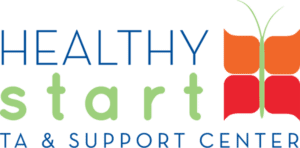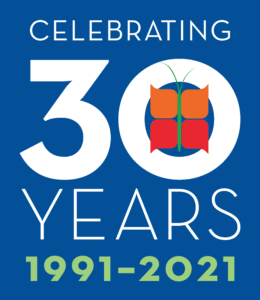Learn
Virtual Grantee Meeting 2021 – Day Four
November 5, 2021
One of the best parts of in-person conferences was arriving early, grabbing some coffee, and chatting with other attendees. While we couldn’t convene in-person this year, we still wanted to provide an opportunity for casual connection and conversation at the Virual Healthy Start Grantees’ Meeting (VGM). As a result, we held JavaTalks from 10:15-11 am ET each morning of the VGM. Attendees were invited to join a JavaTalk room to meet other meeting attendees, including fellow Healthy Start grantees, DHSPS staff, TA & Support Center staff, and other partners. These sessions were not moderated. They were truly an opportunity to have organic conversations, network, and make connections before we began our formal programming for the day.
Each morning of the Healthy Start Virtual Grantees’ Meeting, Shayla Collins of Rain or Shine Consulting provided a 15-minute mindfulness session for attendees. These sessions explored “Compassion on the Go” practices, or mindfulness practices that can be quickly woven into your existing daily routine. We all deserve a moment for ourselves, and often time is limited. These accessible practices can be used to support your overall well-being, as well as the well-being of the families you serve.
By the end of the session, participants will:
- Learn mindfulness practices that can be done anywhere and anytime
- Develop an understanding of the personal nature of mindfulness and strategies for customizing mindfulness to fit their needs
- Understand the importance of dedicating time in our days for self-care.
Speakers:
Shayla Collins, Mindfulness Facilitator, Rain or Shine Consulting, Seattle WA
Plenary Sessions
This session provided an overview of the Health Resources and Services Administration’s (HRSA) national Healthy Start evaluation effort (2021-2025). During the session, the speakers described the process that led to the development of the evaluation design plan. They also provided an overview of the evaluation components, the key evaluation questions, the data collection methods, and the role and participation of the grantees in the evaluation.
By the end of the session, participants will:
- Learn about the goals of the forthcoming national Healthy Start evaluation and the key questions that it will address
- Be able to differentiate the different types of data that will be collected for the evaluation
- Understand the timeline for the data collection efforts
- Learn about their role in the evaluation
- Share their needs for capacity building and support to participate in the evaluation.
Speakers:
Ada Determan, PhD, MPH Health Scientist, Division of Healthy Start and Perinatal Services (DHSPS), Maternal and Child Health Bureau (MCHB)
Saloni Sapru, PhD Senior Study Director, Westat
Judy Harvilchuck, PhD Public Health Analyst, Health Resources and Services Administration
This session reviews the history and purpose of the Secretary’s Advisory Committee on Infant and Maternal Mortality (SACIMM), formerly the Secretary’s Advisory Committee on Infant Mortality (SACIM). Participants will hear updates on the Committee’s priorities and learn about the recommendations for reducing infant and maternal mortality that SACIMM recently submitted to the Secretary of the U.S. Department of Health and Human Services (HHS).
By the end of the session, participants will:
- Learn the history of SACIMM and its relationship to Healthy Start
- Understand the Committee’s purpose/charge, and what the Committee has recommended to HHS to reduce infant and maternal mortality and eliminate disparities in these outcomes
- Understand which recommendations are relevant to Healthy Start and how grantees can influence SACIMM.
Speakers:
Vanessa Lee Infant Mortality CoIIN Coordinator, Division of Healthy Start and Perinatal Services (DHSPS), Maternal and Child Health Bureau (MCHB)
Edward Ehlinger, MD, MSPH Public Health Metaphysician and Acting Chairperson, Secretary’s Advisory Committee on Infant and Maternal Mortality (SACIMM)
Belinda Pettiford, MPH Branch Head, Division of Public Health, Women’s Health Branch, North Carolina Department of Health and Human Services (HHS)
In this session, we describe the impact of colonization and historical trauma on health disparities in American Indian and other Indigenous populations. We discuss the role of Adverse Childhood Experiences on Indigenous Health, and we focus on developing a strengths-based approach to improving health outcomes in disadvantaged communities. We also discuss the concept of Indigenous Health as an academic discipline, and we describe the Indigenous Health PhD program and the Indians Into Medicine (INMED) program as promising practices to promote health equity.
By the end of this session, participants will:
- Define Historical Trauma
- Describe the impact of boarding schools and residential schools on Indigenous health
- Identify culturally-relevant strategies to improve maternal, child, and family health equity.
Speakers:
Donald Warne, MD, MPH Director, Indians Into Medicine (INMED) and Public Health Programs, University of North
“A goal without a plan is just a wish!” It’s time to prepare for the next steps in your Healthy Start program’s fatherhood work. During this session, Kenn L. Harris and Kenneth Scarborough will reflect on lessons learned from Days 1 and 2 of the Virtual Grantees’ Meeting (VGM), as well as from past fatherhood trainings. They will use those learnings to provide a framework for helping Healthy Start programs and practitioners move towards successfully achieving the benchmark of serving 100 fathers. Meeting this benchmark is essential to the overall success of Healthy Start programs, and reflecting on the past is an important step towards doing so. What is your next step?
By the end of the session, participants will:
- Develop a framework for creating their own plan moving forward.
Gain resourceful tools that can help in establishing a plan and goals as part of their plan. - Learn helpful tips to navigate through past challenges in meeting the benchmark in enrolling and serving 100 fathers.
Speakers:
Kenn L. Harris, Executive Director & Engagement Lead, Healthy Start TA & Support Center (TASC), National Institute for Children’s Health Quality (NICHQ)
Kenneth R. Scarborough, MDIV, MPH Fatherhood and Men’s Health Consultant, National Healthy Start Association
(NHSA)

